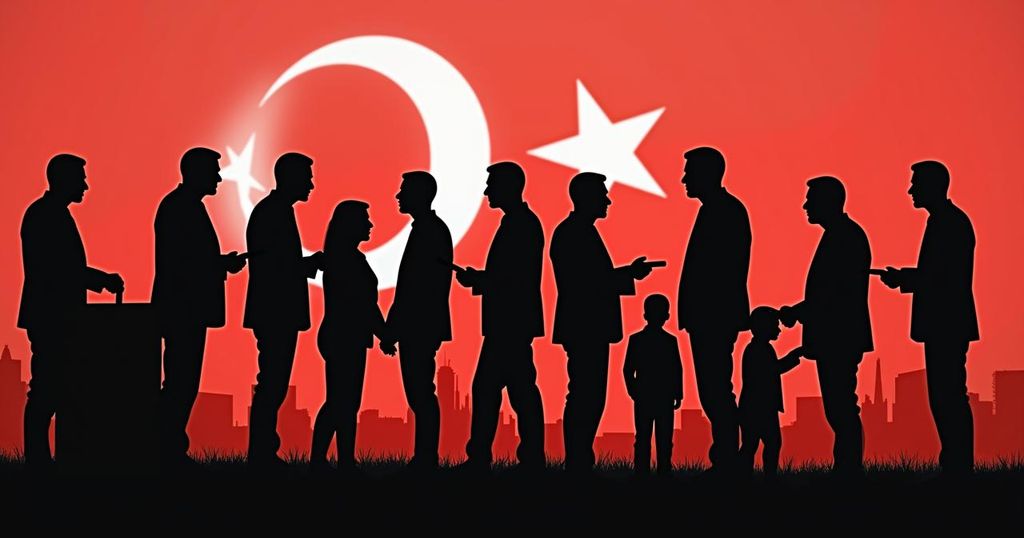The Stakes of Tunisia’s Presidential Election: A Harrowing Reality

The upcoming Tunisian presidential election is set against a backdrop of significant political repression under President Kais Saied since his rise to power in 2019. Rights groups have criticized the decline in civil liberties, while the electoral process is mired in allegations of manipulation, further signaling the deterioration of Tunisia’s democratic fabric that emerged post-Arab Spring. Saied is expected to win despite widespread public disillusionment and limited candidates, marking a critical juncture in the nation’s governance.
The upcoming presidential election in Tunisia, scheduled for Sunday, holds great significance as it represents the first election since President Kais Saied’s ascent to power in 2019. Saied initially garnered support as an independent candidate, lacking prior political experience. His subsequent consolidation of power in July 2021, when he enacted a self-coup by suspending parliament and dismissing the prime minister, has been contentious. Under his leadership, Tunisia’s civil liberties, including freedom of speech, have deteriorated, with numerous arbitrary arrests targeting critics and opponents of the regime. Despite widespread disillusionment with traditional party politics, Saied is widely expected to secure a second term, amidst accusations of a preordained and “rigged” election process. The political climate in Tunisia, once lauded as a beacon of democratic success following the protests of the Arab Spring in 2011, has drastically changed. Following the Jasmine Revolution, which successfully ousted the long-standing dictator Zine El Abidine Ben Ali, there emerged a vibrant civil society eager to engage in politics. Major organizations like the UGTT, UTICA, LTDH, and ONAS significantly contributed to maintaining democratic processes and were awarded the Nobel Peace Prize in 2015 for their efforts. However, prior to Saied’s takeover, Tunisia’s political landscape was fraught with instability, characterized by a succession of nine unstable governments within a decade and ongoing socioeconomic hardships. The parliament before its dissolution in 2021 was notorious for chaotic proceedings and violent confrontations among its members, reflecting the broader public dissatisfaction. Today, the field of candidates for the presidential election is starkly limited, consisting of only three notable figures including Saied himself. The Independent High Authority for Elections (ISIE) disqualified numerous candidates, raising doubts regarding the credibility of the election process, especially after the body underwent restructuring under Saied’s influence. The judiciary, too, has been effectively undermined as Saied replaced the elected High Judicial Council and dismissed numerous judges arbitrarily, leaving little space for judicial independence. Media freedoms have also sharply declined, with enigmatic legislation stifling dissent and transforming the press landscape into a largely subdued entity. Elements of civil society have seen their voices suppressed, leading to a variety of political figures and activists languishing in prison on charges deemed spurious by international rights groups. Despite intermittent protests and a resurgence in public dissent, the scale and impact of these demonstrations have been limited, indicating a complex interplay of repression and resistance.
Tunisia’s political landscape has experienced significant turmoil since the Arab Spring revolutions of 2011, during which the nation was regarded as a leading success story of the region’s uprisings. The Jasmine Revolution resulted in the ousting of long-time dictator Zine El Abidine Ben Ali, introducing a wave of hope and political engagement from civil society. Nevertheless, the rise of President Kais Saied, particularly following his self-coup in 2021, has led to an alarming regression in democratic norms, civil liberties, and governance. The erosion of parliamentary democracy, coupled with a crackdown on dissent and the media, poses a critical challenge to the political future of Tunisia as the citizens head to the polls once more.
In summary, Tunisia’s presidential election reflects a turbulent period in the nation’s political history. The overwhelming expectation is that President Kais Saied will retain power, despite allegations of electoral malpractice and the systematic suppression of opposition voices. The challenges facing Tunisia underscore the precarious state of democracy in a country that once stood as a symbol of hope following the Arab Spring. As civil society becomes increasingly constrained and aspirations for political reform continue to face opposition, the upcoming election may serve not as a turning point, but rather as a reaffirmation of the status quo under Saied’s rule.
Original Source: www.aljazeera.com








